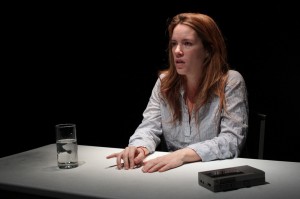Bash: LaBute is Back in Black
Neil LaBute is a curious case among screenwriters and playwrights. His pieces often feel didactic and mean-spirited, aimed at the failures of the innocent (like Fat Pig) or at women (Nurse Betty) or both. He frequently stands outside an experience rather than participating in it, taking out his own frustrations and imperfections on his characters and, by proxy, his audience.
And then there is Bash: Three Plays.
This trio of plays was first produced in the 1990s. LaBute himself wrote about the Dublin production in 2001: “Atrocity is the New Black,” and he fulfills that statement in these short, but brutal, works. At the Studio Theater on 42nd Street (part of Theater Row in New York) in an appropriately small, dark box of a space, LaBute’s characters start out seemingly like Barbie or Ken, the people next door. Slowly and casually, with each passing sentence before your eyes, they transform into murderous monsters who are stillthe people next door. This is a three-part litany of casual atrocities and matter-of-fact brutality, as seen through the eyes of the perpetrators, and brought into focus through the playwright’s language. This is LaBute at his best: taking mundane characters that inflict misery on others in the name of insignificant goals and with no redeeming value or virtue.
The first section, “Iphigenia in Orem,” is loosely based on the Greek myth of Agamemnon’s daughter who sacrificed herself, so that her father’s empire might thrive. LaBute’s Olympus is an anonymous hotel room and Agamemon is a nondescript businessman whose infant daughter recently died. He is telling his story to an invisible listener – who we assume is a woman, as she is drinking wine – which starts with his daughter smothering accidentally under a quilt while he was asleep downstairs. As the story unravels, it turns out his job was threatened by an aggressive female colleague, and that perhaps the “sympathy” factor of a lost child might turn in his favor and was not so accidental – the rest can be left to your imagination.
The second piece, “A Gaggle of Saints,” features a pair of conservative college sweethearts coming to New York for a dinner dance at the Plaza – and ends with the woman asleep in a hotel room with a girl she has known “since kindergarten” and the telling of a hideous gay-bashing episode perpetrated by her boyfriend, bringing both their sexual identities into question. The third section, and perhaps the most frightening, called “Medea Redux,” features a woman who was made pregnant at 14 by one of her high school teachers, and the terrible revenge she takes on him as a grown-up and through their child.
Dustin Crouse and Dana Leigh Snyder are wondrous in the various roles they trade off here. Crouse, with the soft, neutral face of a true American Anglo/German mutt, has a way, through slight nuance of tone, of quietly grabbing your guts and twisting them as you become more and more aware of his characters’ sociopathic tendencies. Snyder, especially in “Medea,” is capable of making you see the little girl in her as well the revenge-minded adult – as though her encounter with the teacher left her stuck in that part of her childhood, screaming to get out — with adept body language that makes one squirm. The minimal set allows LaBute’s flat language take center stage. It surprises us as the phrases build to these horrifying acts that have little or no effect on the people who perpetrated them. These incidents leave the audience feeling, after all is said and done, that they are the ones who have truly been bashed.
Bash can be seen from January 18-21 at the Studio Theater, 410 West 42nd St. For more information and showtimes please visit http://theatrerow.org.

